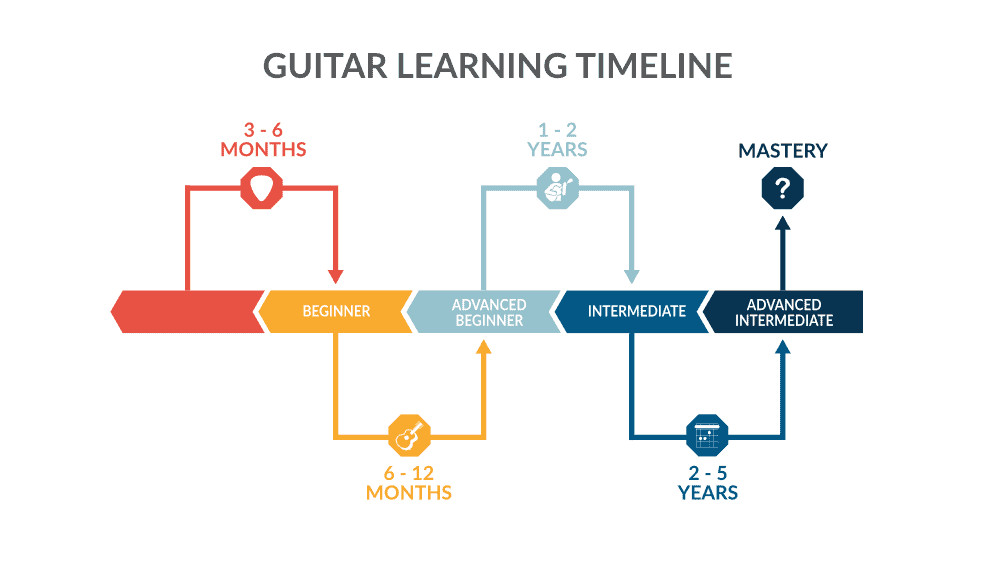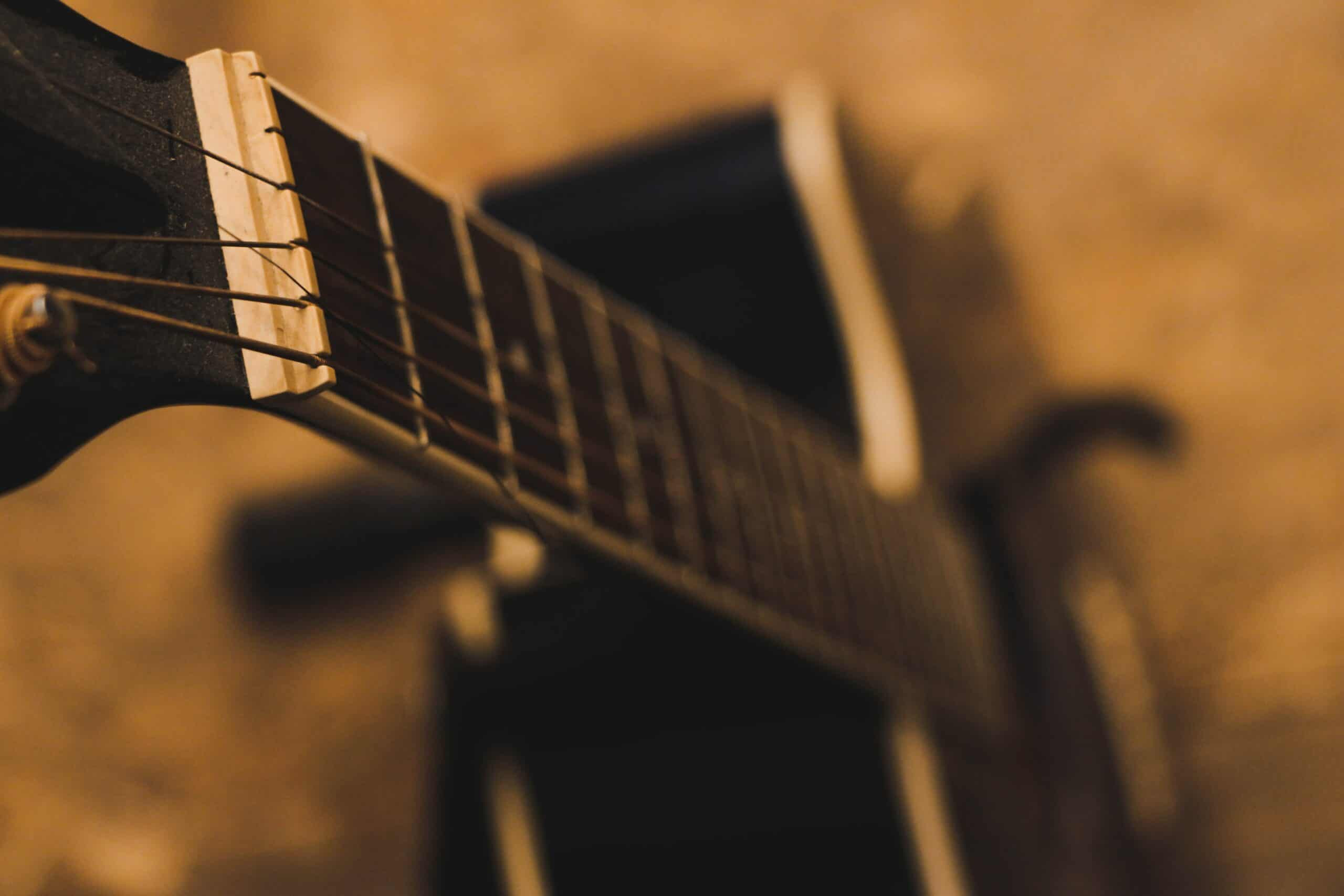Are you eager to start your guitar journey and wondering, “How Long To Play Guitar proficiently?” At guitarplayers.net, we understand your excitement and desire to make music. While the path is unique for everyone, we offer a realistic timeline and valuable insights to help you become the guitar player you aspire to be. Let’s explore the factors influencing your progress, set achievable goals, and discover the joy of mastering the guitar, one chord at a time. This article will cover practice strategies, skill development, and musical milestones.
1. What’s a Realistic Guitar Learning Timeline for Beginners?
A realistic guitar learning timeline for beginners is typically 3-6 months to play basic chords and songs, laying a strong foundation for future progress. Beginning the guitar journey involves building finger strength, developing calluses, and learning fundamental chords.
1.1. The Initial 3-6 Months: Building Your Foundation
In the initial 3-6 months, beginners can expect to learn the following:
- Basic Open Chords: Mastering chords like A, D, E, G, C, and their minor variations.
- Simple Strumming Patterns: Developing a sense of rhythm and timing with basic strumming.
- Easy Songs: Playing simplified versions of popular songs using the chords you’ve learned.
- Finger Exercises: Building finger strength and dexterity through regular exercises.
- Basic Music Theory: Understanding fundamental concepts like rhythm, notes, and chord progressions.
This initial period is crucial for building a solid foundation. According to a study by the Berklee College of Music in July 2023, students who dedicate at least 30 minutes a day to practice during this phase show significant improvement in their chord transitions and strumming accuracy.
1.2. Common Challenges and How to Overcome Them
Many beginners face common challenges that can impact their progress. Here are some of these challenges and tips to overcome them:
- Finger Pain: Build calluses gradually by practicing regularly in shorter bursts.
- Chord Changes: Practice smooth transitions between chords slowly and deliberately.
- Frustration: Set realistic goals and celebrate small victories along the way.
- Lack of Motivation: Find a practice buddy or join a local guitar community for support.
1.3. Staying Motivated and Engaged
Staying motivated is key to making consistent progress. Here are some tips to keep you engaged:
- Set Achievable Goals: Break down larger goals into smaller, manageable steps.
- Learn Songs You Love: Choose songs that inspire you and make practice enjoyable.
- Track Your Progress: Keep a practice journal to see how far you’ve come.
- Reward Yourself: Celebrate milestones with small rewards to stay motivated.
- Join a Community: Connect with other guitar players online or in person for support and inspiration. At guitarplayers.net, you’ll find a vibrant community of guitar enthusiasts ready to share their experiences and offer encouragement.
 Beginner guitar practice for building foundational skills
Beginner guitar practice for building foundational skills
2. What is the Advanced Beginner Phase (6 Months to 1 Year)?
The advanced beginner phase, spanning from 6 months to 1 year, involves refining basic skills, learning new chords, and exploring more complex strumming patterns. This stage is about expanding your musical vocabulary and improving your overall technique.
2.1. Expanding Your Chord Vocabulary
During this phase, you’ll want to expand your chord knowledge to include:
- Barre Chords: Mastering barre chords like F, B♭, and C♯.
- Minor Chords: Learning more minor chords and their applications.
- Seventh Chords: Introducing seventh chords like G7, C7, and D7.
- Chord Inversions: Understanding and practicing different chord inversions.
2.2. Mastering More Complex Strumming Patterns
To add more variety to your playing, focus on mastering complex strumming patterns such as:
- Syncopated Rhythms: Incorporating syncopation to create a more dynamic feel.
- Fingerpicking: Learning basic fingerpicking techniques for a softer, more intricate sound.
- Hybrid Picking: Combining strumming and fingerpicking for added texture.
2.3. Introduction to Basic Music Theory
Understanding basic music theory concepts can greatly enhance your playing. Focus on learning:
- Scales: Understanding major and minor scales and their applications.
- Chord Progressions: Analyzing common chord progressions and how they work.
- Key Signatures: Identifying key signatures and their corresponding scales and chords.
- Time Signatures: Understanding different time signatures and how they affect rhythm.
2.4. Overcoming the Plateau
Many guitar players experience a plateau during this phase. Here’s how to overcome it:
- Set New Goals: Challenge yourself with new songs or techniques.
- Seek Feedback: Ask a teacher or experienced player for constructive criticism.
- Practice Consistently: Stick to a regular practice schedule to maintain momentum.
- Explore New Genres: Try playing different styles of music to broaden your horizons.
3. What to Expect During the Intermediate Phase (1-2 Years)?
The intermediate phase, lasting from 1 to 2 years, involves delving into more advanced techniques, exploring different genres, and developing your personal style. It’s about becoming a more versatile and confident guitar player.
3.1. Advanced Techniques and Skills
During this phase, you’ll want to focus on developing advanced techniques such as:
- Alternate Picking: Improving your picking speed and accuracy with alternate picking.
- Legato: Learning legato techniques like hammer-ons, pull-offs, and slides.
- Tapping: Exploring two-handed tapping for creating unique sounds and textures.
- Sweep Picking: Mastering sweep picking for playing arpeggios at high speeds.
3.2. Exploring Different Genres
To broaden your musical horizons, explore different genres such as:
- Blues: Learning blues scales, licks, and chord progressions.
- Jazz: Exploring jazz chords, improvisation, and comping techniques.
- Classical: Studying classical guitar techniques and repertoire.
- Rock: Mastering rock riffs, solos, and power chords.
- Country: Learning country licks, chords, and strumming patterns.
3.3. Developing Your Own Style
Developing your own style involves:
- Experimentation: Trying out different techniques, sounds, and genres.
- Listening: Immersing yourself in the music of your favorite guitar players.
- Improvisation: Practicing improvisation to develop your own unique voice.
- Composition: Writing your own songs or guitar pieces to express your creativity.
3.4. The Importance of Regular Practice
Consistent practice is crucial during the intermediate phase. Aim for at least 30-60 minutes of focused practice each day to maintain and improve your skills.
 Intermediate guitar player developing own style
Intermediate guitar player developing own style
4. How Long to Play Guitar for the Advanced Intermediate Phase (2-5 Years)?
The advanced intermediate phase, spanning 2 to 5 years, involves mastering advanced techniques, performing regularly, and pursuing specialized areas of interest. This is where you transition from being a skilled player to a true musician.
4.1. Perfecting Advanced Techniques
During this phase, you’ll want to perfect advanced techniques such as:
- Improvisation: Developing your improvisational skills to create compelling solos and melodies.
- Composition: Writing original songs and guitar pieces that showcase your unique style.
- Arranging: Arranging songs for different instruments or ensembles.
- Recording: Learning how to record and produce your own music.
4.2. Performing Regularly
Performing regularly is essential for developing stage presence and confidence. Look for opportunities to play at:
- Open Mics: Showcase your talent at local open mic nights.
- Coffee Shops: Perform acoustic sets at coffee shops or cafes.
- Bars and Clubs: Join a band and play gigs at local bars and clubs.
- Private Events: Offer your services as a guitarist for weddings, parties, and other events.
4.3. Specializing in a Specific Genre or Style
Consider specializing in a specific genre or style that resonates with you, such as:
- Jazz Guitar: Focus on jazz chords, improvisation, and comping techniques.
- Classical Guitar: Study classical guitar techniques and repertoire.
- Fingerstyle Guitar: Master fingerstyle techniques for solo guitar performance.
- Metal Guitar: Develop your shredding skills and learn metal riffs and solos.
4.4. The Role of Mentorship and Collaboration
Seek out mentors and collaborators who can provide guidance and inspiration. Learning from experienced musicians can accelerate your progress and open up new opportunities.
5. What Are the Key Factors Affecting Your Guitar Learning Timeline?
Several factors can affect your guitar learning timeline, including practice habits, learning resources, and natural aptitude.
5.1. Practice Consistency and Quality
Consistent and focused practice is the most important factor in determining how quickly you improve. Aim for regular practice sessions that are both productive and enjoyable.
- Frequency: Practicing daily, even for short periods, is more effective than infrequent, long sessions.
- Focus: Eliminate distractions and concentrate on the task at hand during practice.
- Structure: Follow a structured practice routine that addresses your weaknesses and builds on your strengths.
5.2. Learning Resources and Guidance
Having access to quality learning resources and guidance can significantly accelerate your progress. Consider:
- Guitar Lessons: Taking lessons from a qualified guitar teacher can provide personalized instruction and feedback.
- Online Courses: Enrolling in online guitar courses can offer structured learning and access to a wide range of resources.
- Instructional Books and Videos: Using instructional books and videos can supplement your learning and provide new insights. Visit guitarplayers.net for lessons, reviews, and community support.
5.3. Natural Aptitude and Musical Background
While anyone can learn to play the guitar, natural aptitude and prior musical experience can give you a head start. However, dedication and hard work can overcome any initial disadvantages.
5.4. Setting Realistic Goals
Setting realistic goals is essential for staying motivated and on track. Break down larger goals into smaller, manageable steps and celebrate your progress along the way.
6. Why is Setting Realistic Expectations Important?
Setting realistic expectations is crucial for avoiding frustration and maintaining motivation. It’s important to understand that learning guitar takes time and effort, and progress is not always linear.
6.1. Avoiding Frustration
Unrealistic expectations can lead to frustration and discouragement. By setting achievable goals, you can experience a sense of accomplishment and maintain a positive attitude.
6.2. Maintaining Motivation
Realistic expectations can help you stay motivated by providing a clear sense of direction and progress. Celebrating small victories along the way can boost your confidence and keep you engaged.
6.3. Enjoying the Process
Focus on enjoying the process of learning guitar rather than solely focusing on the end result. Embrace the challenges and celebrate the small victories, and you’ll find the journey to be more rewarding.
7. What Role Does Deliberate Practice Play in Skill Development?
Deliberate practice involves focusing on specific areas of weakness and working to improve them through targeted exercises and techniques. It’s a more effective approach than simply playing through songs without a clear goal in mind.
7.1. Identifying Weaknesses
The first step in deliberate practice is to identify your weaknesses. This could be anything from chord transitions to strumming patterns to fingerpicking techniques.
7.2. Setting Specific Goals
Once you’ve identified your weaknesses, set specific goals for improvement. For example, if you struggle with barre chords, set a goal to be able to play them cleanly and smoothly within a certain timeframe.
7.3. Focused Exercises and Drills
Develop focused exercises and drills to address your specific weaknesses. For example, if you’re working on chord transitions, practice transitioning between two chords repeatedly until you can do it smoothly and efficiently.
7.4. Seeking Feedback and Adjusting
Seek feedback from a teacher or experienced player and adjust your practice routine accordingly. Getting constructive criticism can help you identify areas for improvement and refine your technique.
8. How Can You Measure Your Guitar Playing Progress?
Measuring your guitar playing progress can help you stay motivated and on track. Here are some ways to track your improvement:
8.1. Recording Yourself
Record yourself playing regularly and compare your performance over time. This can help you identify areas where you’ve improved and areas where you still need to work.
8.2. Tracking Your Practice Time
Keep track of your practice time and monitor your progress over time. This can help you stay consistent and motivated.
8.3. Setting Performance Goals
Set performance goals, such as playing a certain number of songs at an open mic night or recording a demo. This can give you a tangible goal to work towards.
8.4. Seeking Feedback from Others
Ask for feedback from other guitar players or a teacher. Getting constructive criticism can help you identify areas for improvement and refine your technique.
9. How Does Age Affect Guitar Learning?
While it’s often said that it’s harder to learn new skills as you get older, age is not necessarily a barrier to learning guitar.
9.1. Learning as a Child or Teenager
Children and teenagers may have an easier time learning guitar due to their brains being more adaptable. However, adults can still make significant progress with consistent effort and dedication.
9.2. Learning as an Adult
Adults may face challenges such as limited time and responsibilities, but they also have advantages such as greater focus and discipline. With the right approach, adults can successfully learn to play the guitar and enjoy all the benefits it has to offer.
9.3. Adapting Your Approach
Regardless of your age, it’s important to adapt your approach to suit your individual needs and learning style. This may involve finding a teacher who understands your challenges and goals, or using online resources that cater to your specific skill level.
10. How Can guitarplayers.net Help You on Your Guitar Journey?
guitarplayers.net is your ultimate resource for guitar learning, offering lessons, reviews, a vibrant community, and much more.
10.1. Lessons and Tutorials
Access a wealth of lessons and tutorials covering a wide range of topics, from basic chords to advanced techniques. Our expert instructors provide clear, concise instruction to help you master the guitar.
10.2. Gear Reviews and Recommendations
Find unbiased reviews and recommendations for guitars, amplifiers, and accessories. Our expert reviewers provide detailed analysis to help you make informed purchasing decisions.
10.3. Community Forums and Support
Connect with a community of guitar enthusiasts from around the world. Share your experiences, ask questions, and get support from fellow players.
10.4. Sheet Music and Tabs
Access a vast library of sheet music and tabs for your favorite songs. Learn to play along with your favorite artists and expand your repertoire.
Ready to start your guitar journey? Visit guitarplayers.net today to explore our resources, connect with our community, and unlock your musical potential. Whether you’re a beginner or an experienced player, we have everything you need to succeed. Address: 1140 Boylston Street, Boston, MA 02215, United States. Phone: +1 (617) 747-2261. Website: guitarplayers.net.
FAQ: Your Guitar Learning Questions Answered
1. How long does it take to learn basic guitar chords?
It generally takes 3-6 months of consistent practice to learn basic guitar chords and play simple songs.
2. How long should I practice guitar each day?
Aim for at least 30 minutes of focused practice each day to make consistent progress.
3. Is it harder to learn guitar as an adult?
Adults can learn guitar successfully with focus, discipline, and the right approach, despite potential challenges like limited time.
4. Can I learn guitar online?
Yes, online guitar courses and resources can provide structured learning and access to a wide range of materials.
5. What are some common challenges for beginner guitar players?
Common challenges include finger pain, chord changes, frustration, and lack of motivation.
6. How can I stay motivated while learning guitar?
Set realistic goals, learn songs you love, track your progress, and join a community for support and inspiration.
7. What is deliberate practice?
Deliberate practice involves identifying weaknesses, setting specific goals, and using focused exercises to improve.
8. How can I measure my guitar playing progress?
Measure progress by recording yourself, tracking practice time, setting performance goals, and seeking feedback from others.
9. What are the key factors affecting my guitar learning timeline?
Key factors include practice consistency, learning resources, natural aptitude, and realistic goals.
10. How can guitarplayers.net help me on my guitar journey?
guitarplayers.net offers lessons, reviews, community support, and sheet music to help you succeed.

